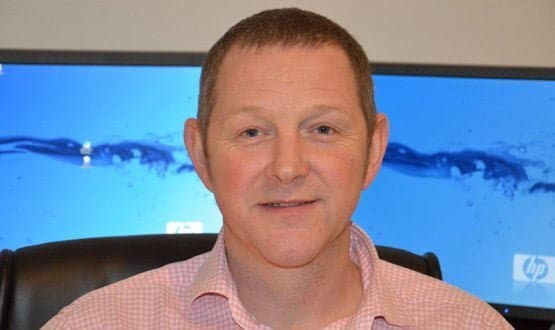EHI interview: Dr Mark Griffiths
- 15 February 2013

They say you should never work with children or animals. One man who disproves the first bit of this popular trope is the new chair of the UK Imaging Informatics Group, Dr Mark Griffiths.
As a paediatric radiologist, he finds working with children challenging, but immensely rewarding. “Children become sick very quickly but they also bounce back very quickly too,” he says. “If we can help a child we are looking at potentially 70 years of improved life, so the benefit is huge.”
New times, new chair
Dr Griffiths trained in London but has held a consultant post at University Hospital Southampton NHS Foundation Trust for nearly 13 years.
At the beginning of February, he became chair of the UK Imaging Informatics Group, following in the footsteps of Dr Neelam Dugar, a consultant radiologist at Doncaster and Bassetlaw Hospitals NHS Trust, who filled the role for five years.
The Group was originally developed under the auspices of the Royal College of Radiologists. It provides a platform for radiologists, radiographers, health informatics professionals, project managers, physicists, and imaging industry employees interested in PACS, teleradiology and other related IT developments.
As the new chair, Dr Griffiths wants the forum to generate discussion that helps to release the potential of novel technologies to benefit everyday clinical practice.
Over the past few years, he argues, imaging informatics has developed so there are uniform standards to enable the effective exchange of information and the prevention of confusion from different dialects.
Now, he argues, there is a need to further enhance the free flow of information and to do it on a wider scale. “We need to work smarter and utilise regional resources by facilitating the flow of patient data. This enables patient choice, improves collaboration and helps expert opinion.”
Working through the refresh
The PACS/RIS market in England is in the middle of a refresh, triggered by the imminent end of the National PACS Programme contracts placed by the National Programme for IT in the NHS.
Trusts that are going out to tender for new systems are placing an emphasis on securing their own data and being able to share images more easily. They are also looking for system flexibility and more regular updates than they secured from the programme.
Dr Griffiths is all too familiar with the PACS renewal process, as chair of the Salisbury, Wight and South Hampshire Domain NHS Trust consortium. This has just awarded a contract to Sectra to supply Sectra PACS to six trusts in the region for the next seven years.
The web-based system should enable data relating to imaging investigations to be seamlessly transferred from one NHS organisation to another within the Portsmouth, Southampton, Hampshire and surrounding areas.
The hope is that this will result in shorter lead times, a better service for referring doctors, and shorter waiting times for patients.
Time to grasp opportunities
Speaking as chair of the UK Imaging Informatics Group, Dr Griffiths says the refresh is an opportunity for trusts to work with different suppliers and to negotiate contracts to better suit their needs.
“The move from local service provider contracts to local frameworks with new suppliers provides the perfect opportunity to improve the service rather than just accept a like for like exchange,” he argues.
“This is important. We now need to move on, but not in a mad rush, to replace our systems. We need to develop not just strip and replace.”
In doing so, he acknowledges there are risks of losing some of the undoubted benefits of the national programme way of doing things.
“The benefits that we did have previously [were] of working with a smaller number of suppliers and of many people using the same system, providing lots of cohesion. The risk with breaking this up is that we lose cohesion; but the advantage is more local control.”
He added that new contracts should make projects more nimble. “It’s the ability to do rapid turnaround and make development that is so important. For example, sprint developments are very important – our ability to influence changes to the way we work is essential.”
But also to provide vital feedback
Against this background, Dr Griffiths argues that a vital role of the forum is to provide valuable information and feedback to suppliers to influence the development of new technology.
“We are learning from our mistakes, and this is where the forum has a major use. Hopefully suppliers will notice when a lot of people are commenting in a certain way.
“To improve our systems people need to throw their views freely into the forum. If we blinker ourselves then we may miss huge opportunities and advances elsewhere that potentially might be easily implemented.”
New issues to face
Dr Griffiths will hold his post for three years. In that time, a host of new issues will undoubtedly emerge.
Asked what he thinks are going to be the big issues for discussion, he notes two in particular; developing and sharing data, and developing new ways of working between radiologists and clinicians.
“I feel we must understand radiology images and investigations are important to patient and treating clinician not just the radiologist. Therefore, we must engage outside of radiology to ensure that we provide the right service to our patients.”
Again, he sees an IT component to this. As an example, he cites the huge expansion into 24/7 imaging in all trusts and the increased use of tertiary centres and clinical pathways that ‘hub-and-spoke’ out to district general hospitals.
“Imaging may be conducted in one place but treatment in another. To best treat patients in this scenario, [we must be able to] seamlessly transfer images and reports with our workloads. If we cannot do this, patients will be disadvantaged.”
He is passionate about taking every opportunity to integrate technology into clinical practice. He also believes that radiologists need to drive the change.
“If, as clinicians, we don’t engage in getting the technology right then we will find that clinical work and patients will miss significant benefits,” he argues.




